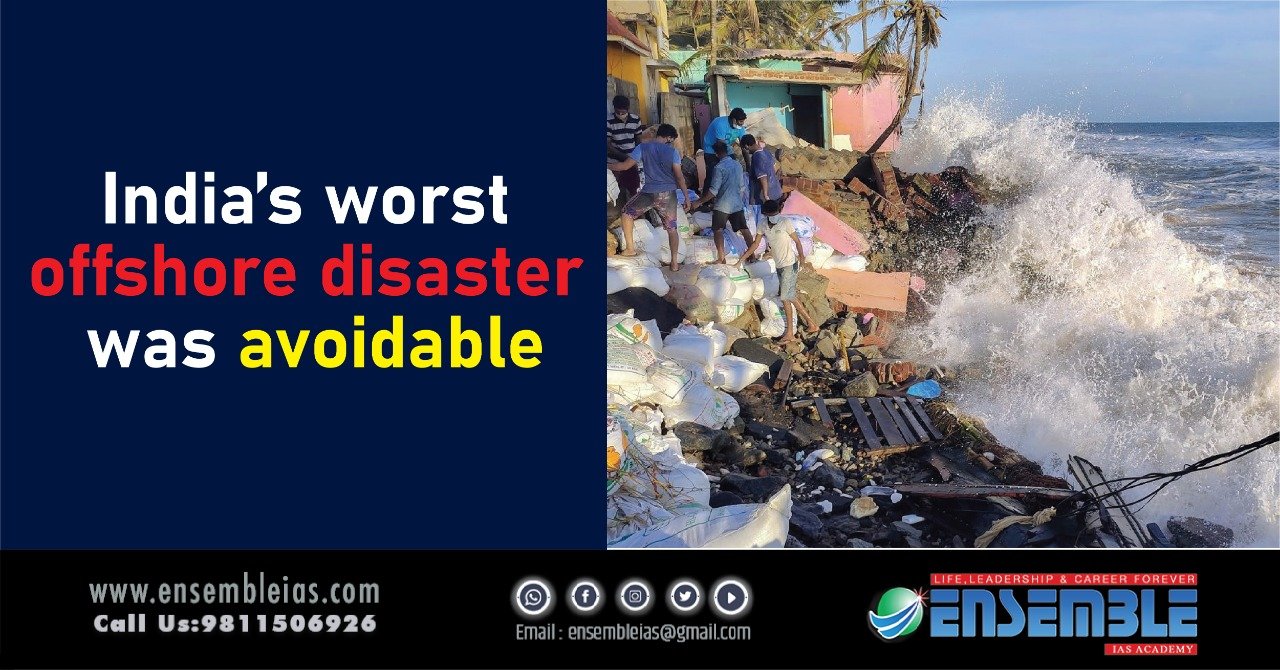India’s worst offshore disaster was avoidable: Systemic inefficiencies, multiplicity of agencies, and violation of safety protocols led to the P-305 tragedy
Cyclone Tauktae has taken a heavy toll on lives and property along India’s west coast, and while every life lost is to be grieved, the sinking of accommodation barge P-305 on May 17 about 35 miles off Mumbai in the Arabian Sea was a deeply unfortunate, and avoidable, tragedy.
To buy our online courses: Click Here
A total of 261 workers, who were on an assignment with Oil and Natural Gas Corporation (ONGC), were reported to have been on board the barge (also referred to as Papa-305), and 49 victims are feared killed. While 186 of those on the ill-fated barge have been rescued by the Navy in very adverse weather conditions (torrential rain, 25 foot waves and 40 mph gales), many workers are yet to be accounted for and a massive rescue operation is underway. Other barges and a tugboat have also been damaged, and the numbers of those drowned/lost could increase.
The loss of precious lives could have been avoided if all the involved agencies had followed standard safety regulations and protocols, both before and during the build-up of the cyclone. When the final death toll is confirmed, P-305 will rank as the worst offshore disaster for India.
One hopes that the appropriate policy lapses will be objectively reviewed by the political apex and institutional accountability sought. To put it bluntly — heads must roll, and the lives of contract workers who have little or no voice as a collective must not be taken for granted.
The ministry of petroleum and natural gas has announced that a high-level inquiry would be constituted to identify the “lapses and gaps” in the system. While this is welcome, past experience has demonstrated that when it comes to matters of safety at sea and the efficient regulation of the maritime domain, the existing institutional status quo — inadequate, inefficient and low on integrity — is the preferred default mode. This is despite Prime Minister Narendra Modi’s personal advocacy of security and growth for all in the region (Sagar), in relation to the Indian Ocean, which he had outlined in 2015.
Accommodation work barges (AWB) are the equivalent of rudimentary dormitories at sea for contract workers and their living conditions are spartan. Given the high operational costs in maintaining a work force on an oil rig or platform at sea, cost-cutting and penny-pinching is endemic to the off-shore hydrocarbon sector and Bombay High is no exception. In the pecking order, the contract worker is at the lower end of the ladder and it appears that very few safety norms and regulations have been put in place. ONGC and its major contractors are more than aware of the grim, ground reality.
Barges are large, flat-bottom floating structures with cramped built-up accommodation, and when they have no self-propulsion, they are deemed to be “dumb”. P-305 belonged to this category, and, with 261 people on board, it would have been very vulnerable to the cyclone.
Safety of human lives at sea is a complex responsibility, one that is difficult to regulate and enforce given the nature of the maritime domain and the vast number of seafarers. From the traditional fisherman to the more skilled seaman on a merchant vessel or oil-rig worker — the number of individuals who are out at sea is vast.
In the Indian context, there is no single nodal national maritime authority and many verticals exist by way of ministries or departments with watertight silos that are zealously guarded. Turf sensitivities and personality clashes are intense. In the current tragedy, the ministries of petroleum, shipping and defence are involved, and both the ONGC and the Director General (DG), Shipping have direct operational responsibilities. Concurrently, the DG, Coast Guard, who is also the Chairman of the National Search and Rescue Board (NSRB), has a direct locus in such cases.
An objective review of the Tauktae debris should identify the institutional lapses, from the most glaring (unserviceable life rafts on P-305 is criminal negligence) to the most obvious — why was a dumb barge, with 261 people on board, allowed to remain at sea even though the cyclone warning was received a week prior to its sinking? Between DG Shipping, ONGC and the Coast Guard, did the obvious danger to the human lives on the barges not lead to the flashing of amber lights?
India has an anomalous maritime sector management pattern, wherein domain competence is ignored and generalist civil servants are preferred for the top job. Consequently, DG Shipping is a position often tenanted by a civil servant with little or no maritime experience or knowledge. Learning on the job is the norm and regrettably, the global standard of safety (of human lives and ships) is often compromised.
Also Read: Power’s new dimension
If PM Modi’s vision of Sagar is to be meaningfully realised, the safety of every seafarer must be valued and the contract workers on P-305 should not be forgotten as the current focus on cyclone Tauktae dissipates. Institutional distortions and procedural dissonances must be set right and placing the entire onus on a “dumb” scapegoat avoided. An independent panel of domain experts must investigate this avoidable tragedy.




